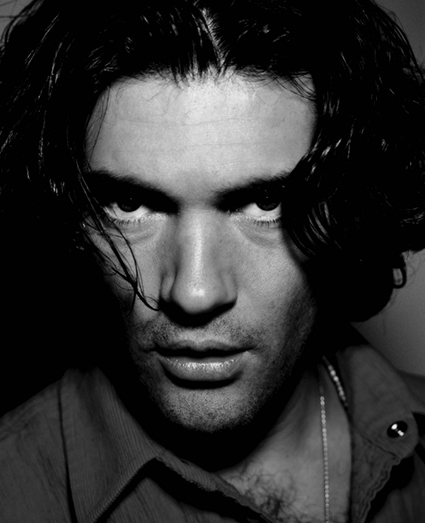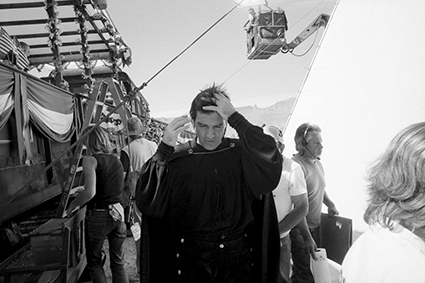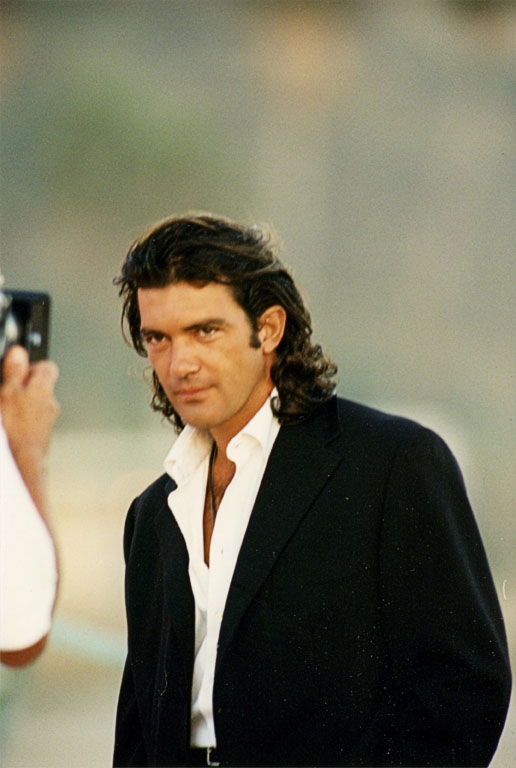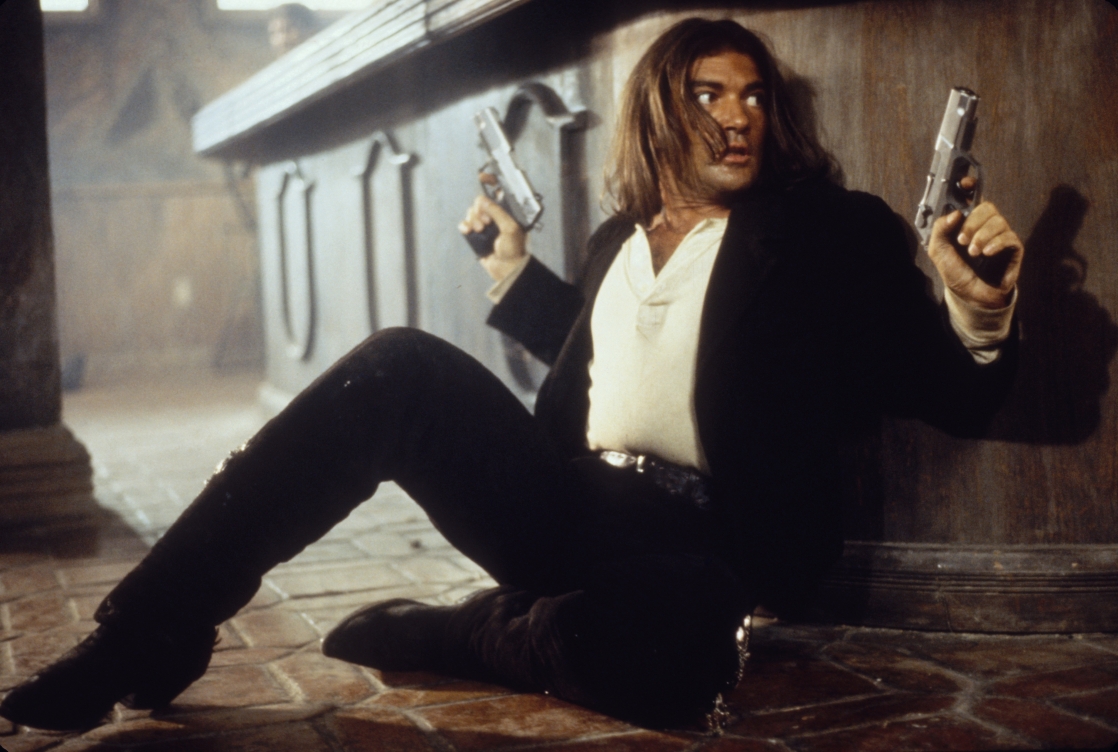*Antonio Banderas
(56 years old)
10 August 1960
Málaga, Andalucía, Spain
5' 8½" (1.74 m)
(56 years old)
10 August 1960
Málaga, Andalucía, Spain
5' 8½" (1.74 m)
He was born José Antonio Domínguez Banderas on August 10, 1960, in Málaga, Andalusia, Spain. His father, Jose Dominguez, was a policeman in the Spanish civil guards. His mother, Doña Ana Banderas Gallego, was a school teacher. Young Banderas was brought up a Roman Catholic. He wanted to play soccer professionally and made much success playing for his school team until the age of 14, albeit his dream ended when he broke his foot. At that time he developed a passion for theatre after seeing the stage production of 'Hair'. Banderas began his acting studies at the School of Dramatic Art in Málaga, and made his acting debut at a small theatre in Málaga. He was arrested by the Spanish police for performance in a play by Bertolt Brecht, because of political censorship under the rule of General Francisco Franco. Banderas spent a whole night at the police station, he had three or four such arrests while he was working with a small theatre troupe that toured all over Spain and was giving performances in small town theatres and on the street.
In 1979, at the age of 19, he moved to Madrid in pursuit of an acting career. Being a struggling young actor, he also worked as a waiter and took small modeling jobs. At that time he joined the troupe at the National Theatre of Spain, becoming the youngest member of the company. Banderas's stage performances caught the attention of film director Pedro Almodóvar, who cast the young actor in his film debut Laberinto de pasiones (1982). Banderas and Almodovar joined forces in making innovative and sexually provocative movies during the 1980s. In 1984 Banderas made headlines in Spain with his performance as a gay man, making his first male-to-male on-screen kiss in Almodovar's La ley del deseo (1987). Banderas's long and fruitful collaboration with Pedro Almodóvar eventually prepared him for international recognition that came with his work in the Academy Award-nominated film Mujeres al borde de un ataque de "nervios"(1988). In 1991 he appeared as an object of Madonna's affection in En la cama con Madonna (1991).
In 1992 Banderas made his Hollywood debut with Los reyes del mambo tocan canciones de amor (1992). Because he did not speak English at that time, his dialogue for the film was taught to him phonetically. Banderas shot to international fame with his sensitive performance as a lover of Tom Hanks' AIDS-infected lawyer in Philadelphia (1993), then played opposite Tom Cruise and Brad Pitt in Entrevista con el vampiro (Crónicas vampíricas) (1994). Banderas further established himself as one of Hollywood's leading men after co-starring in Evita (1996) opposite Madonna in the title role. In 1998 he won acclaim for his portrayal of Zorro, opposite Anthony Hopkins and Catherine Zeta-Jones, in La máscara del Zorro (1998). For the role as Zorro Banderas took training with the Olympic national fencing team in Spain, and practiced his moves with real steel swords, then he used the lighter aluminum swords in the movie. He also took a month-long course of horse-riding before the filming. He later returned to the role in La leyenda del Zorro (2005). In 1999 Banderas made his directorial debut in Locos en Alabama (1999), starring his wife, Melanie Griffith. He received critical acclaim for his portrayal of Mexican artist David Alfaro Siqueiros opposite Salma Hayek in Frida (2002). He voiced Puss in Boots in the Shrek franchise.
Banderas established himself as internationally known Latin heartthrob with charismatic looks, and was chosen as one of the 50 most beautiful people in the world by the People magazine in 1996. He won numerous awards and nominations for his works in film, including three ALMA awards and three Golden Globe nominations, among many other. From 1996 to 2014, Banderas was married to American actress Melanie Griffith and the couple have one daughter Stella born in 1996. Outside of his acting profession, Banderas has been a passionate soccer fan and a staunch supporter of the Real Madrid Football Club. He shares time between his two residencies, one is in the United States, and one in the South of Spain. - IMDb Mini Biography By: Steve Shelokhonov
Spouse*
Melanie Griffith (14 May 1996 - 21 July 2015) (divorced) (1 child)
Ana Leza (27 July 1987 - 1996) (divorced)
Trivia*
Chosen by Empire magazine as one of the 100 Sexiest Stars in film history (#24).Education: School of Dramatic Art, Málaga, Spain
Stepfather of Alexander Bauer and Dakota Johnson.
Siblings: One younger brother, Francisco
Chosen by People (USA) magazine as one of the 50 most beautiful people in the world
Became a father for the 1st time at age 36 when his 2nd wife Melanie Griffith gave birth to their daughter Stella del Carmen Banderas Griffith (aka Stella Banderas) on September 24, 1996.
Married Ana Leza at the Church of San Nicolas in Madrid. Among those who attended were Carmen Maura and Pedro Almodóvar.
Son-in-law of Tippi Hedren and Peter Griffith.
In Spanish, his surname means "flags".
Was nominated for Broadway's 2003 Tony Award for Best Actor (Musical) for a revival of "Nine The Musical."
Spanish citizen.
Supports Málaga soccer team.
Received a star on the Hollywood Walk of Fame [18th October 2005].
Has his own perfume/cologne brand for men.
He had to learn English phonetically and completely from scratch when he arrived in the US to try his luck in Hollywood.
Ex-son-in-law of Concha Leza.
Despite being raised Catholic, Banderas described himself as an agnostic in a People magazine interview but added that whatever spiritual beliefs his kids may or may not have is fine with him.
Received an honorary doctorate on May 2000 from Dickinson College, Pennsylvania.
Listed his favorite 2 movies as Orson Welles' El cuarto mandamiento (1942) and Sed de mal (1958).
Formed his own touring theater group in Spain where he met director Pedro Almodóvar.
Became a fan of his wife, Melanie Griffith, long before he met her. He had first seen her in the film Algo salvaje (1986) and thought she was beautiful and later told a Spanish magazine in 1989 that he would love to meet her. In 1995, when she first arrived on the set of Two Much (1995), he sprinted out of his trailer like a starstruck schoolboy to introduce himself. Nervously, he asked her how old she was. She cursed, laughed, and finally answered she was 37. They soon became a couple and stayed together for 19 years.
Brother-in-law of actress Tracy Griffith and production designer Clay A. Griffith.
Lives in Los Angeles, California, Aspen, Colorado and Marbella, Spain.
Contrary to false claims, he is not the first Spanish actor to portray Zorro. Spanish actor José Suárez portrayed Zorro several decades earlier in the 1953 film La montaña sin ley(1953), who is followed by another Spanish actor Carlos Quiney in the 1970s films La última aventura del Zorro (1969), El Zorro de Monterrey (1971), and El Zorro caballero de la justicia (1971). Banderas is also not the first Latino to play Zorro; other Latinos have preceded him such as Rafael Bertrand (1964), Rodolfo de Anda (1976), and Henry Darrow(1980s).
Is of Latin descent.
Launched his "Blue Seduction Women" perfume. [July 2008]
Portraying director and womanizer "Guido Contini" in the Roundabout Theatre Company's revival of the Yestin/Kopit musical "Nine" at Broadway's Eugene O'Neill Theatre in New York City. [July 2003]
He has also provided the Spanish voice-over for Puss in Boots since his first appearance in Shrek 2 (2004).
Personal Quotes*
I don't want anything I don't deserve, [but] if they offer me more money, I'm not stupid.[on his wife, Melanie Griffith, having more plastic surgery] This lust for beauty is a terrible thing. I've forbidden her from ever going to a cosmetic surgeon again. It is something we have agreed to for the sake of our marriage.
If they had offered me James Bond, I probably couldn't have gone to England anymore in my life. James Bond with an accent? That would have been something.
I hate that cat ["Puss in Boots" from Shrek 2 (2004)]. Ever since he appeared in my life he's more important than me. Now women always say, "Oh, I love that cat. He's so cute". Before, it was, "I loved you in [La máscara del Zorro (1998)]. And sometimes you think, "Is she saying that because she has some other . . . intention?" But no. They love the cat, and they hate me.
To be married in our profession is not an easy thing. There's too many beautiful people around, very interesting people. It's just a matter of really having-being patient and probably having the capacity and the faith of falling in love with your own wife again. That happens to me.
Melanie [wife Melanie Griffith] is more of a disciplinarian with the little girl than me, probably because it's my first baby. She gets everything easy from Papa. I am more weak. She takes advantage of me.
I admired [wife Melanie Griffith] before I loved her.
I get more attention as "the pussycat" in Shrek tercero (2007) than I ever did as Zorro.
I don't believe in careers, I just picture myself always as one of those old actors from the 19th century who go from village to village in their repertoire.
When you see actors on the red carpet they seem to know each other but really it's like a wax museum. Los Angeles is probably one of the fakest cities in the world. For me it is a working place.
[on being pragmatic in the film business] Oh, absolutely. You have to be, in this professional world; otherwise you'd spend your whole life in a psychiatric ward! Going up and down continuously, "I am great!" "I am depressed." No, I think it's important that you understand in this profession that the results are not continuously the most important thing. But the way that you work and the things that you do, for me it's very important in my mind to have clear that my professional life starts at "action!" and finishes at "cut," and whatever happens around that -- yeah, it can be very satisfying sometimes, it can be very depressing at times, but it's just another side of the work. The work is what you do when you are acting. And, I have to say, during the time that we were doing [The Code(2009) I felt I was doing what I wanted to do.
[on films going directly to DVD, and the challenges of making The Code (2009)] It's funny, because in Spain, it [The Code (2009)] was released theatrically and it did very well with practically no promotion at all, competing with big Hollywood movies. And I understand that they're going to open in like 25 countries also, theatrically. But in America, no -- there were offers from studios, I am aware of that because I talked to [Nu Image and Millenium Pictures head] Avi Lerner, but they didn't want to give the money necessary to compete in a theatrical environment in terms of publicity and promotion. But that's the way it goes! That is our world.
For me, I joined [the project] very late in the movie; almost 15 days before they started, they called me. And so I had to travel to New York very fast . . . but for me, the big attraction for accepting the role was Morgan Freeman, to tell you the truth. The possibility of working with an actor that I really admire. He's got a tremendous personality. He's one of those guys that it doesn't matter what he does in front of the camera, he's always interesting because he's got this aura. And then, Mimi Leder became one of my attractions to the project, because she's a woman that has inside more than I have seen in the movies. A couple of movies of hers I really like, and when I saw her working, she's very powerful. There's also a sensitivity coming from women that I love, and I've been directed by women three or four times, in terms of directing actors and managing the entire set. It's very interesting. So all of those elements made it for me. Then, the results are something that you never know what's going to happen, especially in a movie like this -- a genre movie made by an independent company. That is the problem. -- more on films going direct-to-DVD and the challenges of "The Code"
[on films going directly to DVD] It's curious, the case of this movie [The Code (2009)]. Because it's a genre movie, and those are movies that normally are supposed to be done by studios. It's very rare -- this is an independent company, but they emulate the studios in a way. It's very difficult to compete with that, because if you have a $20-million movie playing genre, confronting a studio movie with $120-million budget that is doing genre, too, obviously in visual terms and many other ways of looking at a movie these days, especially by the young people who go to the movies these days, it's very difficult to put in competition a movie like ["Thick as Thieves"] with the movies that they have. You know, ["Thick as Thieves"] is a movie that probably, if it would have been presented in the '70s or the '80s, would have been a very successful movie.
[on why films like Lawrence de Arabia (1962) aren't being made anymore] It's very difficult if you want to do those movies within structures that are based in commercial issues. You can do movies like that if you go in the independent world. In fact, last year, for example, Slumdog Millionaire (2008) is a movie that comes from that world, and it breaks structures because they are more daring. But coming from the studios, it's very difficult to find that. I'm not criticizing the studios; they have to do what they have to do. They're looking for commercial movies, and that's fantastic and it keeps alive the industry and I think that's absolutely fine. But if you want to find those types of risks, you have to go to another structure. I think movies serve many purposes; one can be purely entertainment, another can be a reflection of the human spirit, and another goes in another direction, experimental . . . many, many different purposes. All of them are good. I am not criticizing specifically one way of making movies; this just is the way it is.
There is nothing in the world that cannot be cured by love. That is the most thing.
[1995] I don't want to have anything that I don't deserve. Sometimes it even bothers me just to see my name built up more than it actually is. I never believe anything that is happening to me, probably because I am very insecure.
[995] Everything here in Los Angeles is masks, metaphors, unreality. Everything is concerned with image, the box office, stars. But America is many Americas. What I love about Americans is how pragmatic they are. They don't think and obsess in a sick way about doing something. In Europe, you can feel the weight of many years of history. In a village eight kilometers away from another village, people speak a different language, have their own culture that they want to preserve. People here resolve a problem, act fast, and I love that. Here, ideas are volatile; people believe in people. If you're 60 years old here and you come up with a good idea, you get to develop that idea. In Europe, it's all hierarchies.
[1995, on coming to the US] When I first came here, it was like I was starting all over again. I had been doing leading characters in my country for five years. There is no tradition of actors from Spain coming to this country. I had done dozens of movies in Spain where, to survive, you have to do a lot of jobs, to jump from movie to movie because they pay you so few dollars to do any movie. You have to keep working, sometimes pick some things that you are not interested in, just because you are a professional. So, I am coming from a work world which is completely different. In Spain, they are proud of me because I am considered like an international soccer player. I have to win a battle outside so that I can represent my country. In a way, they are going, "Antonio, don't blow it!"
When you see paintings by [Pablo Picasso], whom I love, some of them make people unbelievably uncomfortable. In the museums in Barcelona, you have all of these people filled with morality, lovers of art, confronted with a Picasso of a woman sucking a man's enormous dick, you know? And there's another painting of a man sucking a woman's pussy. It's Picasso and people have to accept it because this is life, it happens, and Picasso reflects that in these paintings. Real artists have the responsibility to break rules.
[1995, in Movieline Magazine] I am not that brilliant. You see, I'm not a star because I am not someone who is playing myself in front of the world. I am not criticizing being a movie star, but I think that to be a star requires you to be brilliant 24 hours a day. That is something that is not in me.
[1993] The big difference between a star and an actor is someone who knows the technique, who knows how to learn from everything that happens to him. A star is acting himself all the time. You have to have the energy for that and a nice character. I don't know if I'm that brilliant the whole day. I have my own shit with me all the time and I don't want to lose that. I can't all the time be making this beautiful smile, faking that I'm someone else, because that's insane.
[1993, on Los reyes del mambo tocan canciones de amor (1992) and learning English] When I had my first interview in London with [director] Arne Glimcher, I only knew three, four lines of English to be used at the right moment. The most important was, "I can do that". I was the last one to be cast, so I read with Kevin Kline and Annabella Sciorra, who were going to play my brother and my wife. So Arnold put me in a Berlitz school in New York for a month to learn English with a bunch of business executives from Japan and France. I saw people crying there, like me, because I thought, "I am so stupid I will never learn this language". One month later, the actors I'd read with were both gone; now, it was Armand Assante and Maruschka Detmers and it was different. And then I had to speak with all these big executives at Warner Bros., Terry Semel and all, and I even forgot Spanish. I would use a word like "bottle", and be thinking, "What a strange word". Still, it was one of the most beautiful experiences of my life.
I feel content. I am 51 years old and I see a lot of work, a lot of people, a lot of faces, a lot of souls. And I feel like I am in the middle of the game. The match is not over and I may score some goals.
Why do people accept so easily the fact that you can take the life of somebody on the screen and nobody is going to complain about it, and they cannot take that you will kiss somebody of your own sex on the mouth?
[on working with Pedro Almodóvar] The feelings I had in the '80s, and had again, is that he's pushing you to the limits: that you are on the verge of a cliff. You are in a situation of vertigo. I don't think Pedro works for the masses.
[2015, on his ex-wife Melanie Griffith] I want - and I think she does too - to maintain a relationship because we have spent many years together ... I would like to maintain a relationship and it is happening, I speak with her every other day.
Taylor Swift was singing on the stage and I was sitting down at one table, having dinner. And I had to go on stage to do a little speech, so she came down the stairs and saw me and said 'Oh Antonio Banderas' and I thought 'Wow, Taylor Swift knows me. That's so cool'. Then she looks as me and she says, 'My grandmother loves your movies' and I said: 'Great, thank you, it was a pleasure meeting you too'. And I almost got tears in my eyes.
Salary*
Evita (1996) $4.000.000
The Body (2001) $12.000.000







































































































































